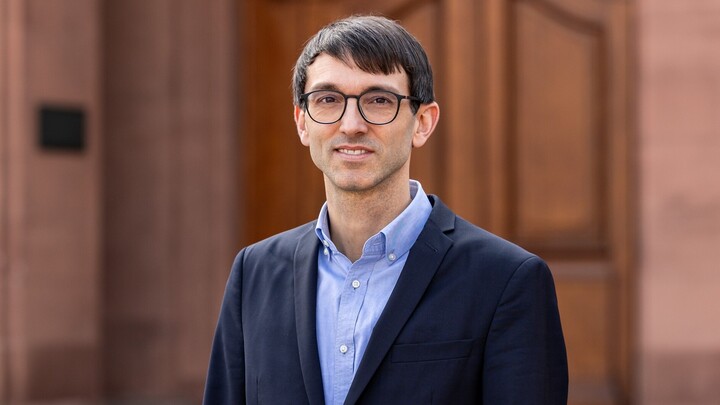Welcome to the University of Mannheim
FORUM introduces new professors at the University of Mannheim. This time: Prof. Marc Ratkovic, Ph.D., Prof. Dr. Corina Aguilar-Raab and Prof. Dr. Sebastian Stier.
Prof. Marc Ratkovic, PhD

Chair of Social Data Science
Statistics, political science, computer science – Prof. Marc Ratkovic, PhD, has a wide range of research interests. And his career path was anything but linear: After graduating from college, he initially worked as a teacher at a New York middle school for three years, followed by a stint as a commercial real estate broker. Born and raised in the US, Ratkovic made some sharp turns before he settled in academia – and from the outset, he did not want to commit to one discipline.
As an assistant professor and lecturer at Princeton University, he explored machine learning in the social sciences, for example. His research there focused on so-called causal inference, that is, methods for drawing reliable causal inference from observational data. His work in this field has been frequently cited in academic journals and won prizes and grants totaling some 850,000 US dollars. Based on more than one billion observations, Ratkovic could show, for example, that a government’s decision to engage in trade is heavily driven by political, rather than economic, considerations. And that such a decision predominantly depends on a country’s openness towards free-trade zones.
After twelve years at Princeton, Ratkovic moved to the University of Mannheim in September 2023. “I came here to build something new and innovative,” he says. He conceives his current project as a service for other researchers, eventually providing them with a quarterly, automated summary of the research output in their own area of expertise. For that purpose, hundreds of thousands of political science articles will be brought to Mannheim. Right now, he is busy building up the server needed for such an endeavor. “It will help my colleagues stay up to date in their research area,” Ratkovic explains. In addition, he is working to advance his own research on language models and tries to find ways of connecting them with basic statistical methods.
The US researcher instantly felt at home in his new surroundings. He also tries to pass on this enthusiasm to his two sons: At the Ratkovic home, bedtime stories revolve around the history of the Kurpfalz region.
Research interests:
- Machine learning
- Causal inference
- Methods in political science
Selected posts:
- 2013 to 2023: Assistant professor at Princeton University
- 2011 to 2012: Postdoc at Princeton University
- 2011: Awarded doctorate at the University of Wisconsin-Madison
Prof. Dr. Corina Aguilar-Raab

Chair of Clinical Psychology, Interaction and Psychotherapy Research
How do people’s relationships and social-emotional competencies affect their psychotherapeutic treatment? And how can they cope with challenging situations using emotional self-regulation? These are just two of many questions that Prof. Dr. Corina Aguilar-Raab is pursuing in her research. A trained psychologist, she took up the Chair of Clinical Psychology, Interaction and Psychotherapy Research at the University of Mannheim in October 2023.
“My research focuses on relationship quality,” says Aguilar-Raab, summarizing her interests. “I study social interactions in the context of health and mental disorders.” In addition, she investigates concepts from the emerging field of contemplative science, such as mindfulness and compassion. Other interests include studying outcome and process factors in psychotherapy – as part of the new master’s program in clinical psychology and psychotherapy, for example – or identifying everyday indicators of whether therapeutic treatment has been successful. “I look forward to developing these research areas and to working with Mannheim students.”
After earning her Diplom degree in psychology from Heidelberg University, Aguilar-Raab specialized in psychodynamic and systemic psychotherapy and received a license and additional qualification for both fields. Working abroad, especially in Asia, provided her with valuable experiences: “I spent some time in Nepal, where I worked in a psychiatric hospital and in an outpatient facility for persons with mental illnesses. This experience had a profound impact on me.”
Most recently, she headed the Psychotherapeutic University Outpatient Clinic at the Institute of Medical Psychology at Heidelberg University Hospital and taught at Heidelberg University. When asked for her reasons for switching to Mannheim, Aguilar-Raab mentions the research concentrations at the School of Social Sciences and the structural setup, including the opportunity to help establish and develop the new master’s program in clinical psychology and psychotherapy. “Plus, the location is perfect – both with regard to collaborating with my colleagues at the department and with regard to interdisciplinary collaboration and the expansion of psychosocial patient care, which is closely linked to my research and teaching interests.”
Research interests:
- Effects of clinical and preventive interventions on social interactions, relationship quality and mental health
- Processes of social interaction and cognition
- Psychobiological assessment of clinical and preventive interventions
Selected posts:
- 2020 to 2023: Established and directed the Psychotherapeutic University Outpatient Clinic at Heidelberg University Hospital
- 2021 to 2022: Substitute professor in clinical psychology at University of Kassel
- 2018 to 2023: Habilitation (Venia Legendi) in psychology at Heidelberg University
- 2018: Licensed as a psychological psychotherapist
- 2007 to 2010/
11: Doctoral studies at Heidelberg University
Prof. Dr. Sebastian Stier

Chair of Computational Social Science
“A win-win situation for me and both institutions” – this is how Prof. Dr. Sebastian Stier describes the position he took up in December 2023. Since then, the social scientist has not only served as Professor of Computational Social Science at the University of Mannheim but also as Scientific Director of the department of the same name at GESIS – Leibniz Institute for the Social Sciences.
At GESIS, Stier is anything but a newcomer: After earning his master’s and doctorate in political science from Heidelberg University, he began working as a postdoc in the GESIS Computational Social Science department in 2016. Computational social science is a young, interdisciplinary field of research at the intersection of various social sciences, computer science and data science. It aims to investigate human behavior using computer-assisted methods. “The field of computational social science has seen very dynamic growth in recent years – and my research profile has grown with it, as it were. Today, I am using a highly interdisciplinary approach,” says Stier about his career.
According to the scientist, his discipline is based on two pillars: “First, we use digital behavioral data – large data sets obtained from online platforms or individual internet users. Second, we use methods developed in computer science that allow us to perform large-scale automated analyses of this data.” In addition to methodological work, his research focuses on the effects of digital media on social and democratic processes.
And how is his work at GESIS different from his work at the university? “The two institutions concentrate on different things. Whereas the University of Mannheim is primarily devoted to research and teaching, GESIS is a research-based infrastructure institution for the social sciences.” It also serves as a service provider by making methods, tools and data available to the social science community, Stier points out. The two institutions have collaborated closely for many years, and the social scientist would like to build on this collaboration moving forward: “The professorship is a great opportunity to deepen this collaboration and to expand it in the field of computational social science.”
Research interests:
- Collecting digital behavioral data
- Digital democracy
- Political sociology
Selected posts:
- 2016 to 2023: Senior researcher at GESIS
- 2018 to 2019: Substitute professor at the University of Duisburg-Essen
- 2015: Awarded doctorate at Heidelberg University
Texts: Yvonne Kaul and Jessica Scholich / August 2024
